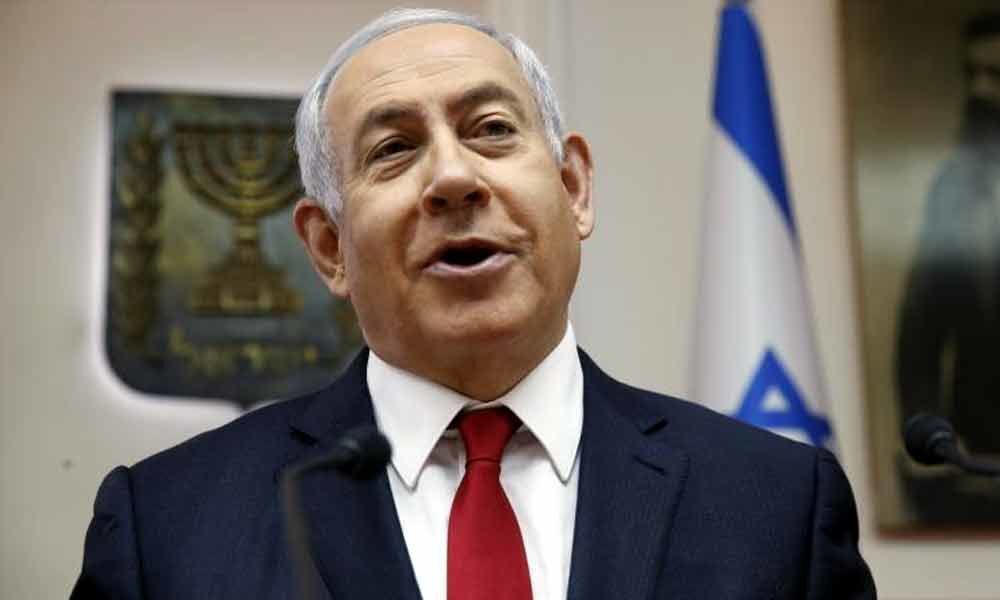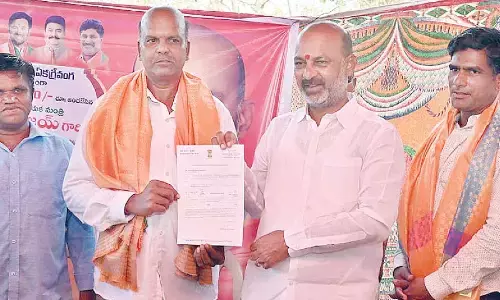Netanyahu faces deadline: New Israeli government or election

At stake is the makeup of the future Israeli government and perhaps Netanyahu’s own perilous legal situation.
Jerusalem: Israel's raucous political world was on edge Wednesday, counting down the hours to a midnight deadline to see whether a new government will be formed or whether, alternatively, there will be an unpresented second national election this year.
Backchannel negotiations were continuing throughout the day to try and hammer out a compromise that would allow Avigdor Lieberman's Yisrael Beiteinu faction to join Prime Minister Benjamin Netanyahu's right-wing coalition. Without him, Netanyahu has no parliamentary majority and won't be able to form a government within the 42 days he was tasked to do so.
Netanyahu and his former top aide Lieberman, who have alternated between a close alliance and bitter rivalry over the past two decades, are now engaged in perhaps the most dramatic episode of their longtime political relationship — a high-stakes showdown in which neither side appears ready to blink first.
At stake is the makeup of the future Israeli government and perhaps Netanyahu's own perilous legal situation.
When Netanyahu's Likud party increased its power to 35 seats in parliament in last month's election and his traditional ultra-Orthodox and nationalist parties secured a solid 65-55 majority, it was assumed he would coast back into office comfortably. In no rush to sign agreements with the other factions, Netanyahu's allies in Likud had already begun drafting a contentious bill aimed at granting him immunity from the various corruption charges awaiting him.
Likud was also looking to push legislation limiting the power of Israel's Supreme Court and paving Netanyahu's path to many more years in office.
But no one seemed to take the mercurial Lieberman into consideration.
Though a staunch nationalist, Lieberman also champions a secular agenda aimed toward his core political base of immigrants from the former Soviet Union and has pledged to confront efforts of the ultra-Orthodox parties to impose their lifestyle on the country's secular majority.
In contrast to Netanyahu's deal-making pragmatism, Lieberman has earned a reputation as a maverick willing to break from his traditional ideological bloc.
The current crisis ostensibly boils down to Lieberman's demand that a current legislation, which mandates that young ultra-Orthodox men be drafted into the military, run its course.
Years of widescale exemptions for them have generated widespread resentment among the rest of Jewish Israelis who serve.
"I am not against the ultra-Orthodox community. I am for the state of Israel. I am for a Jewish state but against a Halachic state," Lieberman wrote on Facebook early Wednesday, using a term that refers to a Jewish state governed by Jewish law.
He derided the so-called ultra-Orthodox counteroffers as "cosmetics for the taxidermic," and vowed to hold his ground. "The conscription bill is not a caprice. It's not derived from ego or vengeance but is a foundation of our world view," he wrote.
The ultra-Orthodox parties consider conscription a taboo, fearing that military service will lead to immersion in secularism, and insist the exemptions stay in place. Netanyahu, dependent on their political support, says they have compromised enough and is refusing to press them further.
After trying to coerce a concession out of Lieberman, Netanyahu and his allies have turned to an all-out offensive. They have accused Lieberman of betraying his voters and dragging the country to an unnecessary and expensive election campaign out of personal spite and jealousy of Netanyahu. Likud has also vowed to campaign hard among Russian speakers in Israel to wipe Lieberman out politically.
According to Israeli law, Israel's largely ceremonial president is charged with choosing a candidate for prime minister with the best chance of putting together a stable majority coalition.
The candidate then has 42 days to do so and if he fails, the president can turn to another candidate and give him 28 days to form an alternative coalition. Only after that fails are new elections called — something that has never happened in Israeli history.
But Netanyahu, who also has a rocky relationship with President Reuven Rivlin, has no intention of letting the full scenario play out and giving his chief opponent, retired military chief Benny Gantz, a chance to build his own coalition.
If there is no deal by midnight Wednesday, Netanyahu vows to pass a bill to dissolve the newly elected parliament and go to elections right away. He shored up his political support Tuesday by incorporating Finance Minister Moshe Kahlon's economic-centric Kulanu party into Likud ahead of a joint run.
Ayelet Shaked, the popular outgoing-justice minister whose New Right faction was not elected to parliament, is also said to be close to joining Likud.
The opposition has vowed to filibuster Wednesday's parliamentary hearings to try and run out the clock, in hopes that if midnight comes without a deal of a bill dissolving parliament, Gantz may get his chance after all to try and for a coalition and become prime minister.
Either way, the dramatic developments look to complicate Netanyahu's precarious legal standing. Israel's attorney general has recommended pressing criminal charges against him in three separate corruption cases, pending a hearing. The charges include allegations that he accepted gifts from billionaire friends and promoted beneficial regulations for a telecom magnate in exchange for positive coverage on a news site.
After many delays, the much-anticipated pre-indictment hearing is scheduled for early October. Netanyahu is unlikely to lock down the required political support for his hoped-for immunity by then and would likely be forced to stand trial.








